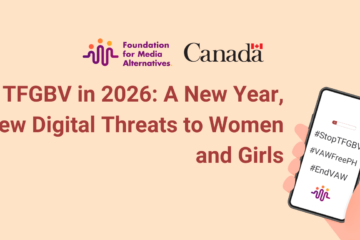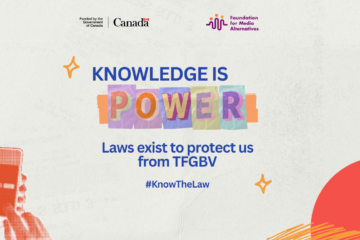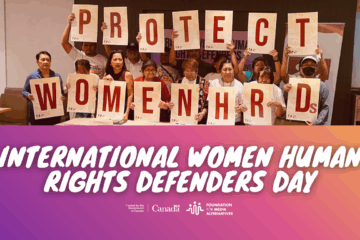The tools we need to fight online gender-based violence
In a patriarchal society, misogyny and violence against women and the LGBTQIA+ community finds its way into nearly every facet of our lives. Digital spaces are not immune; the damaging experiences that women, queer and transgender people face in their day-to-day lives manifests itself online as well, and it does real harm.
In a world that is becoming more and more reliant on ICTs, we need to consider how online gender-based violence impacts those with marginalized genders, and what we can do to prevent the damage.
In order to fight the gender-based violence that women and other vulnerable sectors face online, we can start by recognizing that the internet has immense potential for empowerment. When women, queer and transgender people employ the internet as a means of creating space for themselves and others like them, slowly but surely the misogynistic nature of digital landscapes can be broken down.
The Feminist Principles of the Internet
The Feminist Principles of the Internet (FPI) can help; these principles are a collection of statements that look at internet rights through a gender and sexual rights-minded lens. Organized by Association for Progressive Communications, the principles are a collective effort written by groups of advocates working in women’s, sexual, and internet rights in 2014 and 2015. These principles serve as a living framework that is constantly evolving.
There are currently 17 principles that touch on a broad range of issues related to the rights of marginalized genders online; as a whole their purpose is to provide a framework for women’s and LGBTQAI+ empowerment, movements and realization of rights online.
When we adapt and apply these principles in our own feminist practice, they can serve as a fantastic tool to combat online gender-based violence.
In the fall of 2018, Foundation for Media Alternatives (FMA) ran a series of workshops on FPI for students at University of the Philippines and Far Eastern University. FMA’s goal in running these workshops is to introduce young feminist leaders to FPI, and challenge them to consider how they can contextualize and apply the principles in their own communities.
Why FPI?
There is a need to run FPI workshops, as this information can serve as an excellent framework for women and LGBTQIA+ people working to bring their feminism online. The creation of a safe space allowed participants to share their experiences and exchange knowledge while exploring feminism in the digital sphere.
The FPI workshops generated a great deal of interesting, engaging discussions that allowed participants to dig into the intricacies of feminist practices online. The results were fantastic; participant reviews show that the workshops were successful in delivering relevant, concise content in an effective and well-informed way. The workshops began by outlining and describing the FPI, and continued by having participants critically engage with the principles through discussion and activities.
A broad range of topics and experiences were brought up during the workshops. Participants were particularly interested in discussing access to information about sexual and reproductive health rights, the sexist and systemic erasure of women’s work, and the importance of being in community with fellow feminists both on and offline.
Participants at the University of the Philippines also had a rich conversation about pornography through a gendered and feminist lens. They discussed the fact that porn can be an empowering industry for women and queer people, while also acknowledging that some porn is made by exploiting human trafficking victims. They discussed consent, bodily autonomy, and women-directed porn. Ultimately, participants challenged each other to see porn as a complex industry and profession by bringing to light just how nuanced the topic is. This type of critical knowledge exchange is enriching; it allows participants to confront their own biases, and in effect, become better equipped to apply FPI in a mindful and intersectional way.
The FPI as a tool to tackle eVAW
In collectively engaging with FPI through these workshops, participants were able to broaden their understanding of feminism, and go home with tools they can use to tackle online gender-based violence. This is a critical step towards ensuring that women and LGBTQIA+ people have the resources they need to create spaces for themselves and for movements online, and challenge states and corporations that surveil and control the internet. These are tools that they can not only use themselves, but ones they can share with their own communities to incite broader discussions about creating a feminist internet.
About the author
Ali Watson is an intern from Canada working at FMA. She has an undergraduate degree in History, Religious Studies and Gender Studies, and a strong interest in issues related to gender and sexual diversity. Before interning at FMA, Ali worked with an NGO focused on empowering women and children, and a sexual education centre that works to make information on sexual and reproductive health widely accessible.



0 Comments